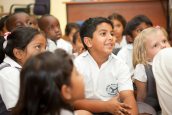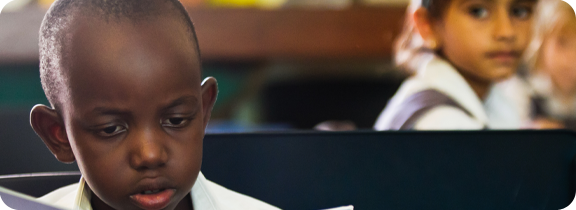
Why Choose the Aga Khan Academy, Dar-es-Salaam
Admission to the Aga Khan Academy, Dar-es-Salaam, is based on merit. This is broadly defined as exceptional intellectual potential, leadership, a commitment to learning, strong sense of integrity, and the desire to work towards and instigate positive change.
As part of a network of Academies, we aim to provide exceptional students, from all backgrounds, with an outstanding education.
We seek students representing a diverse range of economic, cultural, ethnic and religious backgrounds. We look for students who have the ability and motivation to excel academically and who are or will be capable of demonstrating leadership in community service and other co-curricular pursuits.
"In my view, the most important thing a student can learn in any educational institution is the ability to keep on learning."We are more than just schools that strive to give their students a sound academic foundation. We emphasise the importance of academic excellence while instilling in students a sense of civic responsibility and the desire, ability and commitment to give back to their communities locally and globally.
Our educational approach measures success not just by academic achievement, but how students apply what they know to make the world a better place.
The overall educational programme is designed to foster students’ curiosity while providing them with the skills and intellectual confidence to engage with what they do not know and find answers and solutions.
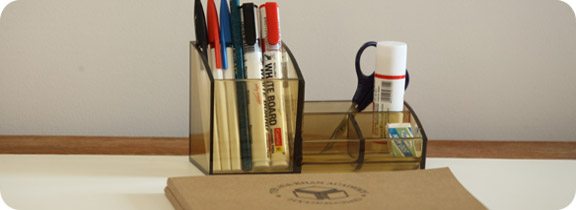
Financial Assistance
Admission to the Academy is based on merit and is means-blind. Students from all socioeconomic backgrounds who satisfy the requirements for entry are encouraged to apply.
Partial to full financial aid is available to accepted students with a demonstrated need. Financial aid awards are reviewed annually and renewed only after reassessment of financial need.
For information about admission, scholarships and financial aid please contact us by email.
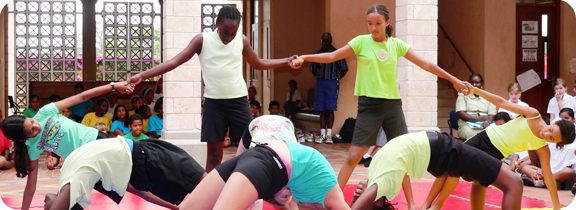
Sporting Activities
One of the goals of the Aga Khan Academy, Dar-es-Salaam is to create principled young people with a strong sense of integrity, honesty, fairness and justice, who respect the dignity of others.
Physical education, and competitive games and sports prepare our students for real-life situations, encouraging them to take leadership roles and allowing them to tackle challenges confidently and in a spirit of cooperation.
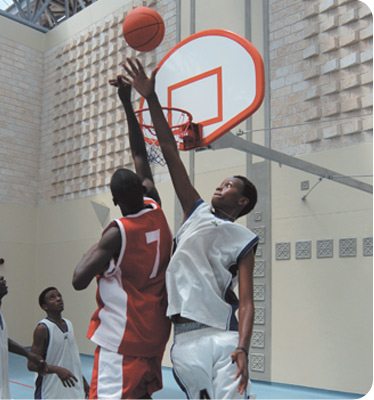 Inter-School Sports
Inter-School Sports
Our students will have the opportunity to represent their school in various sports, such as swimming, cricket, rounders, basketball, hockey, netball, football and athletics.
Teams will cater to students of all ability levels.
Clubs
We will also offer a diverse selection of sporting activities for our students during after school clubs.
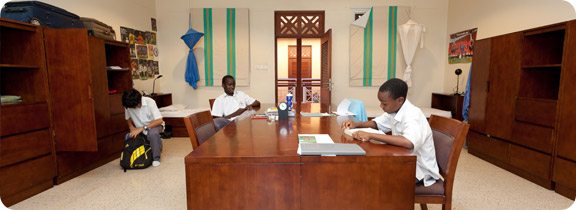
Our Campus
The Aga Khan Academy, Dar-es-Salaam is situated on a 17.68 hectare site that will house both the Academy and the Aga Khan University's Institute for Educational Development.
The site will house the fourth in a network of 18 planned Academies, which offer the highest international standard of education to students in countries across Africa, the Middle East, and South and Central Asia.
Our campus will include the following academic and resource areas:
- Subject and age-specific classrooms
- Well-equipped science and computer laboratories
- Library and resource centres
- Art and music rooms
- Design and technology workshops
- Multipurpose hall
- Religion and culture room
- Career counselling facility.
The Commons Building will house the dining hall and an array of spaces for school activities. It is designed to be the hub of student activity, serving as the Academy’s main space for major school functions, including music and drama performances, and public lectures.
The campus will also include extensive indoor and outdoor sports facilities.

Academic Programme
The Aga Khan Academy, Dar-es-Salaam will initially be opening for Nursery and Junior school students. We offer an education of an internationally recognised standard of excellence to prepare students to become intellectually curious, global-minded citizens of the world.The Academy programme develops students who are committed to positive change and are able to understand and analyse complex issues of local, national and global significance.
Our curriculum is built on the framework of the International Baccalaureate (IB). The IB is a thorough, multidisciplinary curriculum that fosters:
- intellectual curiosity
- creativity
- leadership development
- social consciousness
- a pluralistic sensibility.
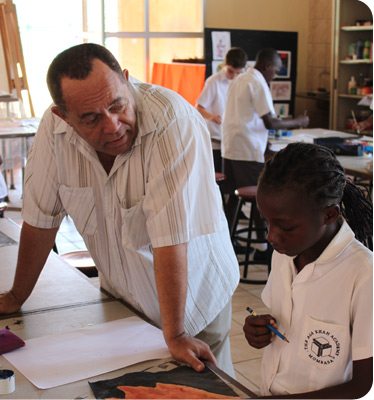 The IB is also known for preparing students for admission to the best universities in their own countries and abroad.
The IB is also known for preparing students for admission to the best universities in their own countries and abroad.
Our focus is on developing students' critical thinking skills and the ability to analyse issues. We also emphasise multicultural understanding and awareness. One of the ways in which we help our students develop skills for ethical leadership is through the Aga Khan Academy Curricular Strands. These are cross-disciplinary areas of study that have been developed for the network of Aga Khan Academies.
Overall Educational Programme
Our curriculum is complemented by co-curricular, athletic and community service initiatives. The overall educational programme is designed to educate well-rounded, civic-minded individuals. It enhances students’ academic excellence, leadership skills, sense of civic responsibility, understanding of global issues, and analytical and study skills. The programme also reinforces an understanding of local languages, history, cultures and environment.
After completing the full Academy programme, students will be expected to be computer literate and have a thorough understanding of the diverse academic disciplines covered in the IB curriculum. They should have mastered at least two languages, including English. Through the planned international exchange programme, our students will be able to enhance their foreign language learning and appreciation of other cultures.
Our graduates thus will be well prepared for the rigours of higher education and to pursue opportunities in an increasingly interdependent world.
For further information on the programme currently being offered at the Aga Khan Academy, Dar-es-Salaam, please visit the Primary Years Programme page.
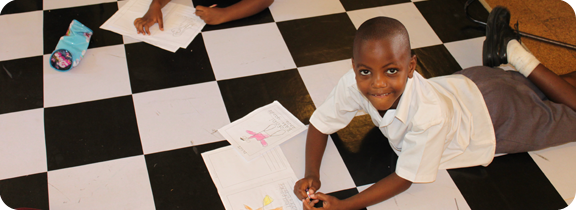
Primary Years Programme
The Junior School of the Aga Khan Academy, Dar-es-Salaam is preparing for authorisation as an International Baccalaureate (IB) World School offering the IB Primary Years Programme (PYP).
Foundations for Lifelong Learning
The Primary Years Programme focuses on the development of the whole child. It is geared towards creating independent, confident and respectful learners.
Our classroom curriculum and after-school activities address the children's social, physical, cultural and ethical development while giving them a strong foundation in all the major areas of knowledge.
 The curriculum consists of five essential elements:
The curriculum consists of five essential elements:
- concepts
- knowledge
- skills
- attitude
- action.
The core subjects we cover include English language, mathematics, social studies, science and technology. Our programme also includes a beginning computing course, physical education, music, art, French and Portuguese.
Students and teachers explore questions in all subject areas using an interactive, student-centered approach. The knowledge element of the curriculum is enhanced by six themes that are studied across the various subject disciplines. These are:
- who we are
- where we are in place and time
- how we express ourselves
- how the world works
- how we organise ourselves
- sharing the planet.
The PYP develops well-rounded students who are well versed in all areas of knowledge. They learn to be intellectually curious, principled, caring, open-minded, well balanced and reflective learners.
Please visit the Admission Requirements page or contact us to find out more about applying to the PYP at the Academy.
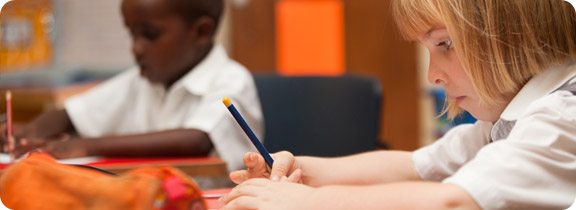
The Aga Khan Academy Curricular Strands
The Aga Khan Academy Curricular Strands are a unique part of the programme offered by the Aga Khan Academies. The strands are areas of learning aimed specifically at developing knowledge, skills and attitudes required by future leaders.
Our goal at the Academies is to develop young people who have strong local roots and are also globally minded. They should be able to become leaders in whichever fields they choose.
To help achieve this goal, we have identified five areas of learning, or strands, that we believe are important for our students. These are:
- Ethics
- Pluralism
- Economics for Development
- Cultures (including Muslim Cultures)
- Governance and Civil Society.
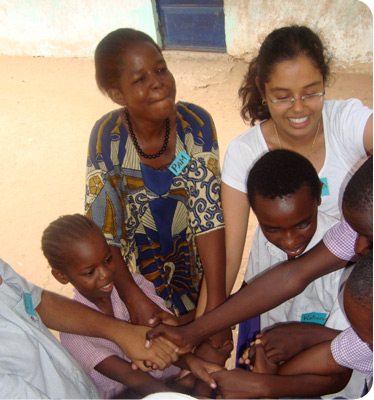 Implementing the Strands
Implementing the Strands
The strands are not taught as independent subjects. Instead, we weave them into the existing subject areas of the academic curriculum. They help inform the selection of content and themes for study. The strands also provide direction for school life outside the classroom in areas such as policy making, recruitment, student life and residential life.
Two of the strands, Ethics and Pluralism, help students develop values and dispositions required by ethical leaders. Our students learn about these areas in theory and are also encouraged to practice what they learn in their everyday lives.
Through the other three strands, our students learn about ideas that are important to the functioning of societies. In particular, they learn about how these ideas impact people’s lives in countries of the developing world. The knowledge they gain helps them understand key issues from both local and international perspectives.
The Strands in Practice
The strands were developed at the first Aga Khan Academy in Mombasa and are designed to be used in different cultural contexts. Teachers from the Aga Khan Academy, Dar-es-Salaam will help tailor the strands for the local environment in Tanzania.
Through the strands, our students develop attitudes and values that will help them throughout their lives. They also gain knowledge and understanding that will allow them to contribute positively to their societies in the future.
For more information on the educational programme offered at the Aga Khan Academy, Dar-es-Salaam, please visit the Academic Programme page.
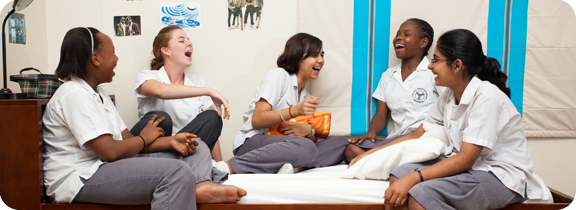
International Exchanges
As the network of Aga Khan Academies becomes established, we will offer our students the opportunity to broaden their experience through exchanges with other Academies.
The Aga Khan Academy, Dar-es-Salaam will include an international exchange programme as part of the Senior School curriculum. This will provide our students with the opportunity to study for an extended period in another of the approximately 18 (planned or currently under development) Academies in Africa, South and Central Asia, and the Middle East.
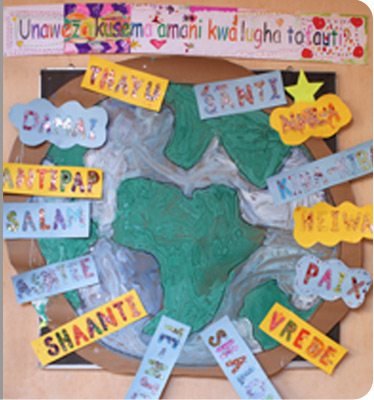 Campus Life
Campus Life
Students from Dar-es-Salaam who go on exchange to another Academy will live in residential facilities in a safe, secure campus setting.
Campus life is an important part of the international exchange programme. Many of the least tangible but most important elements of an education—the development of practical leadership skills, the capacity to make ethical judgments, the ability to navigate through complex cultural settings—are formed outside the classroom. Mealtimes and other informal gatherings offer opportunities for discussion, meetings, language tables and study groups.
Benefits of Study Abroad
The International Baccalaureate programme will be implemented at all Aga Khan Academies. The common curriculum will allow students to study abroad without facing uncertainties regarding compatibility of course study or examinations.
While English is the medium of instruction at all Academies, our students are required to study another language as well. Foreign language learning will be greatly enhanced by immersion in that language through the exchange programme.
Students will also learn to appreciate and respect other nationalities, cultures and intellectual traditions through direct contact with people in other countries. They will broaden their worldview and learn to be at ease in multicultural settings.
For further information on the educational programme offered at the Aga Khan Academy, Dar-es-Salaam, please visit the Academic Programme page.
The Times of India: School With Difference Nurtures Pluralism
Nikhila Henry, from The Times of India, describes her visit to The Aga Khan Academy, Mombasa, where she experiences first-hand how the Academy bridges diverse cultural and economic backgrounds, providing students with a rich learning environment that encourages pluralism and free thinking.
